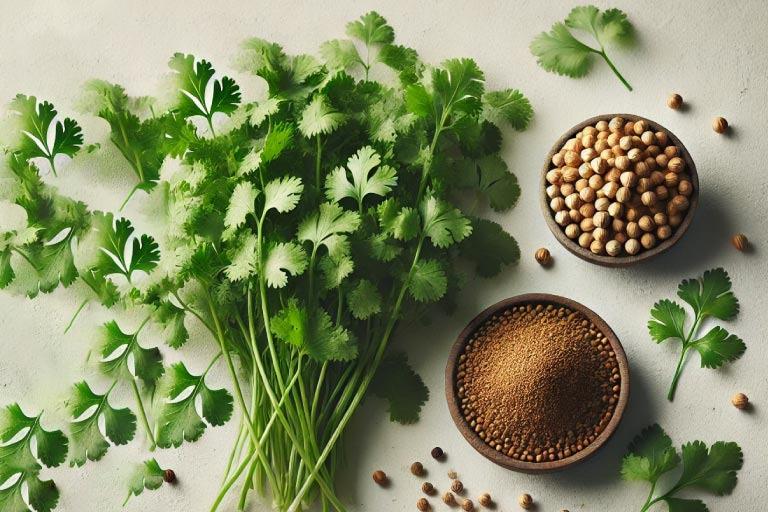
Coriander Seed
Coriander Seed
Coriander seed is one of the oldest known spices in history. The name "coriander" comes from the Greek word koriannon, referring to an insect, as the leaves were thought to have an insect-like smell. The coriander plant, also known as Chinese parsley, is scientifically named Coriandrum Sativum and is widely used in cooking, pharmaceuticals, traditional medicine, and other industries. It belongs to the family Apiaceae. Coriander is an annual herb that typically grows between 30 to 60 cm in height. It has slender stems, feathery leaves, and small umbrella-shaped flowers. Its fruits, commonly known as coriander seeds, are small, spherical seeds with a diameter of about 3-5 mm and range in color from light brown to yellow. While coriander is native to the Mediterranean and West Asia, it is now cultivated worldwide. Coriander is a hardy plant and can be grown in most regions of Iran. Yekta Shimi Azma Company offers this product with the highest quality and ensures a longer shelf life by using appropriate and standard packaging. We are honored to offer this product in various packaging options tailored to your needs.
What are the Components of Coriander?
Coriander is a good source of antioxidants, dietary fiber, manganese, iron, magnesium, phosphorus, calcium, potassium, vitamin C, vitamin K, and B vitamins. The fruit of the coriander plant contains compounds such as linalool, geraniol, coumarins, and flavonoids, which have anti-inflammatory, antiseptic, and calming properties, making coriander a key ingredient in the food, cosmetic, pharmaceutical, and fragrance industries. Coriander is one of the most commonly used spices in cooking, and all parts of the plant can be used. The fresh leaves, known as cilantro, are commonly used as an aromatic herb in salads, sauces, and various dishes. The fruit, or coriander seed, is available as both whole and ground spices, with whole seeds having a longer shelf life and providing more aroma and flavor to dishes. The root of this plant is also used in some Thai cuisines.
History of Coriander Seeds
Coriander is one of the oldest plants used and recorded by humans, with its history dating back to 1550 BC. It is mentioned in the Bible and the writings of Roman physicians, Hippocrates, and other Greek doctors. In Ancient Egypt, coriander was considered sacred and was used both to scent tombs and in the mummification process. In India and Iran, coriander seed is a key ingredient in many spice blends like masala and curry. Its global popularity, even in ancient times, can be attributed to its medicinal properties. Coriander seed powder is highly effective against microbes and was used during outbreaks of diseases like dysentery and cholera, which caused significant mortality in warm seasons. At that time, coriander seeds were relied upon as a swift and potent remedy for such ailments. In ancient times, chewing coriander seeds was believed to treat mouth infections and freshen breathing.
Health Benefits of Coriander Seeds
Coriander seeds have various properties and benefits for human health, some of which are explained below:
1. May help reduce blood sugar:
High blood sugar is a dangerous risk factor for people with diabetes. Coriander seeds can help reduce blood sugar by improving the function of pancreatic beta cells. However, People who have low blood sugar or those taking diabetes medications should be cautious when consuming this substance, because it has a great effect on reducing blood sugar.
2. It contains large amounts of antioxidants:
Coriander seeds are rich in antioxidants that prevent free radical damage. Studies on this substance have shown that the antioxidants in coriander seed extract can reduce inflammation and slow the growth of cancer cells in the lungs, prostate, breast, and colon.
3. Can be beneficial for heart health:
Some studies suggest that coriander may help reduce high blood pressure and lower bad cholesterol (LDL), which are harmful to heart health. In these studies, coriander extract appeared to act as a diuretic, helping the body eliminate excess sodium and water, and lowering blood pressure.
4. It can protect brain health:
Due to its anti-inflammatory properties, coriander seeds may protect the brain against diseases that are associated with inflammation, such as Alzheimer’s, multiple sclerosis (MS), and Parkinson’s.
5. Relieves digestive discomfort and supports gut health:
Oil extracted from these seeds can speed up and promote healthy digestion. A study on people with irritable bowel syndrome (IBS) found that those who used an herbal medicine containing coriander experienced significantly less abdominal pain, bloating, and discomfort compared to those using a placebo. Coriander acts as an antispasmodic, relaxing the digestive muscles that cause IBS and other gut disorders.
6. Fights food poisoning:
This spice contains antimicrobial compounds that can help prevent certain infections and diseases caused by food. Dodecanal is a compound in coriander that can fight against bacteria like Salmonella, which causes food poisoning. One of the studies showed that coriander seeds can fight bacteria that cause urinary tract infections (UTIs).
7. May protect the skin:
Research has shown that the antioxidants in coriander extract can help skin damage caused by ultraviolet (UV) radiation. They can also help prevent cellular damage that leads to accelerated skin aging. Many people use coriander leaf water for skin diseases like pigmentation, acne, oiliness, or dryness, though no research has been done about it. It may also help treat mild skin rashes, including dermatitis.
8. Promotes healthy menstrual function:
Coriander seeds can support a healthy menstrual cycle by regulating the proper function of endocrine glands and the hormones responsible for menstrual regulation. They can also help treat menorrhagia and reduce bloating, cramps, and pain during this period.
Applications of Coriander Seeds in Various Industries
Food Industry: As a spice and flavoring agent in the food and beverage industry, including:
- In the preparation of Iranian, Pakistani, Indian, Mediterranean, and other cuisines.
- In the production of herbal drinks, teas, and malt beverages.
- In making pickles, sauces, and meat marinades.
- In spice blends such as masala and curry.
- In meat products, especially sausages and cold cuts.
- In dairy products such as traditional cheese and flavored yogurt.
- In soups and ready-to-eat meals.
Cosmetic Industry:
Due to their anti-inflammatory and antiseptic properties, coriander seeds are used in facial creams to reduce skin inflammation and treat acne. They are also used in hair care products because of the presence of linalool, which stimulates hair growth and strengthens hair roots. It is also used in massage oils and calming sprays.
Pharmaceutical Industry:
The fruit of coriander is used in medications for digestive disorders, liver problems, and blood sugar and blood pressure regulation due to its antioxidant, antibacterial, and anti-inflammatory properties. It is also used in dietary supplements.
Perfume Industry:
Coriander seed oil, with its citrusy, sweet, and warm aroma, is utilized in perfume formulations. Its scent-fixing abilities make it a key ingredient in long-lasting fragrances.
Agricultural Industry:
Coriander seeds are a natural insecticide, providing an eco-friendly alternative to chemical pesticides. Research has shown that coriander extract can repel insects like mosquitoes and flies and serves as a bio-friendly pesticide in farms.
Is Coriander Seed Safe?
Coriander seeds are generally recognized as safe for both culinary and medicinal uses. They are commonly used in cooking and traditional remedies and are suitable for most people. However, people with diabetes or high blood pressure should use coriander seeds with caution. Pregnant and breastfeeding women should consult a healthcare provider before use. Those with allergies to cumin, fennel, dill, or similar herbs may experience allergic reactions such as asthma, swelling, or hives. The technical team at Yekta Shimi Azma, your trusted supplier of high-quality coriander seeds, provides an extensive range of premium packaging options to meet your needs. For more information, please Contact Us.

